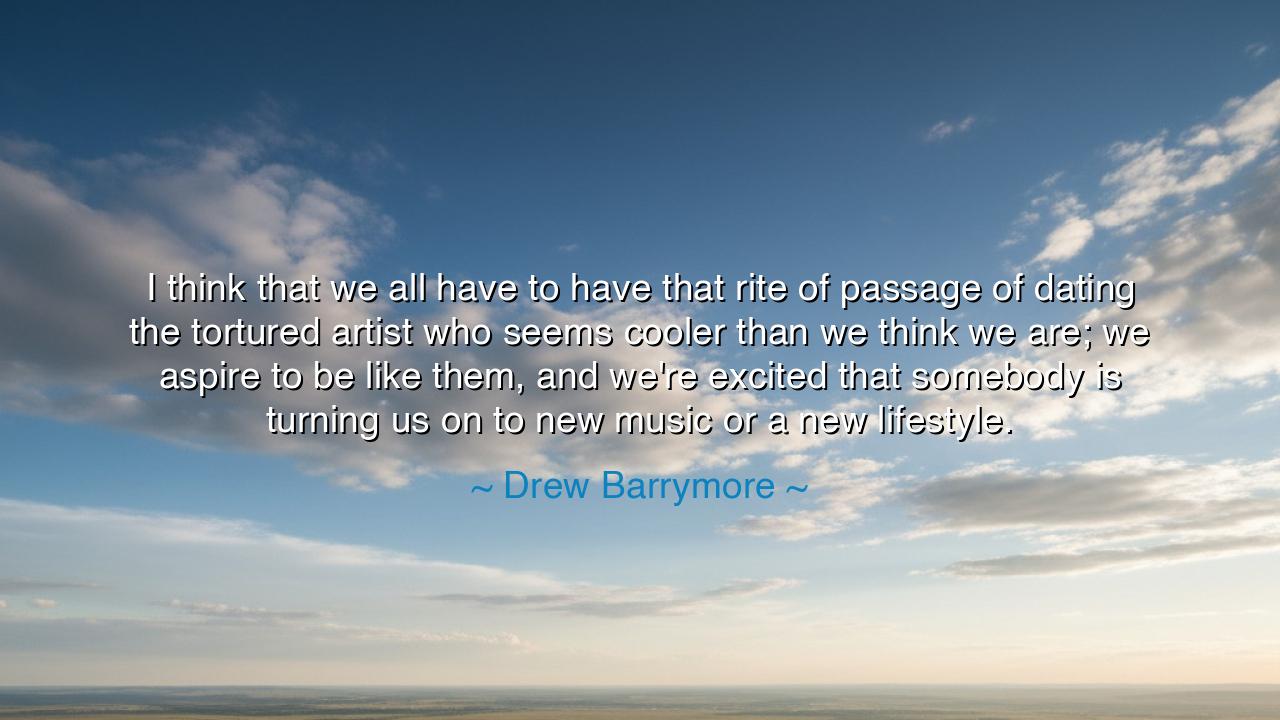
I think that we all have to have that rite of passage of dating
I think that we all have to have that rite of passage of dating the tortured artist who seems cooler than we think we are; we aspire to be like them, and we're excited that somebody is turning us on to new music or a new lifestyle.






In the chambers where youth first barters innocence for experience, a bright and dangerous wisdom is spoken: “We all have to have that rite of passage of dating the tortured artist who seems cooler than we think we are; we aspire to be like them, and we’re excited that somebody is turning us on to new music or a new lifestyle.” Hear how the sentence breathes—yearning, imitation, initiation. It names a season when the self, still soft as clay, seeks a kiln in another’s fire. The artist’s glamour stands like a doorway to a larger room; the novice steps through, dazzled by the promise that art will translate them into someone braver, stranger, freer.
The ancients would have nodded at this curriculum of the heart. For every apprenticeship of the hand—potter to master, scribe to elder—there is an apprenticeship of desire. We stand near a blazing spirit, and our edges begin to glow. The tortured artist embodies intensity: sleepless creation, fierce opinions, a refusal to live by small arithmetic. To date such a person is to borrow their voltage and hope the current will remake us. It is not only romance; it is catechism. The lessons arrive as records, poems, after-midnight arguments, and the illicit joy of seeing the ordinary street suddenly drenched in meaning.
Yet the charm carries a thorn. What looks like pure halo often hides heat: volatility, self-absorption, the stormy weather of unhealed wounds. The lover who seems cooler than we are can become a mirror that never reflects us back. We aspire and, in aspiring, risk erasing the timid but truthful self that first came to learn. Thus the rite of passage must not end in enthrallment; it must end in discernment—honoring the gift of widened taste (new music, new lifestyle) while refusing to surrender the steering wheel of one’s own becoming.
Consider a true tale from our recent scrolls: Patti Smith and Robert Mapplethorpe, “Just Kids” written like a votive. Two young seekers arrive in New York hungry for art and significance. They kindle each other’s courage, share rooms and ramen, haunt museums, and apprentice themselves to beauty and risk. Their bond is not tidy; it changes shape, it wounds and heals, it asks for sacrifices neither fully understood at first. But out of that furnace, each forges a distinct voice. The initiation was real—bohemian corridors, avant-garde saints, new music erupting like spring—but it becomes wisdom because Patti does not vanish into Robert nor he into her. The rite births two artists, not one shadow.
Older pages echo the pattern with harsher lighting: Rimbaud and Verlaine, meteors colliding above Paris. Genius intoxicates; boundaries shatter; poetry leaps to new registers while lives fracture. The lesson is not to avoid intensity, but to honor its cost. When the tortured artist invites you into their weather, ask whether the storm grows crops or only uproots them. Initiation without integration is wreckage; initiation with integration is growth.
What, then, is the seed of the quote’s wisdom? It blesses the pilgrimage toward breadth—toward bands we never would have heard, rooms we never would have entered, thoughts we never would have dared. That blessing stands. But it also warns that aspire must mature into choose. The artist can open doors; only you can decide which rooms become your house. The gift of the rite of passage is not to become them; it is to become more truly yourself, enriched by what they revealed.
Carry away these practices like charms sewn into your traveling cloak: (1) Keep a ledger of gifts received—albums, books, habits—from this new lifestyle; beside each, note what nourishes you and what drains you. (2) Name your non-negotiables before you are dazzled—sleep, kindness, sobriety, respect—and do not trade them for cooler shadows. (3) Create as you consume: for every three shows you attend, make one thing of your own—song, sketch, paragraph—so the fire shapes you, not scorches you. (4) When the romance shifts, keep the culture but release the cult: say thank you for the new music, then tune your own instrument. In this way, the rite of passage becomes a passage indeed—through another’s brilliance into the durable light of your own.






AAdministratorAdministrator
Welcome, honored guests. Please leave a comment, we will respond soon